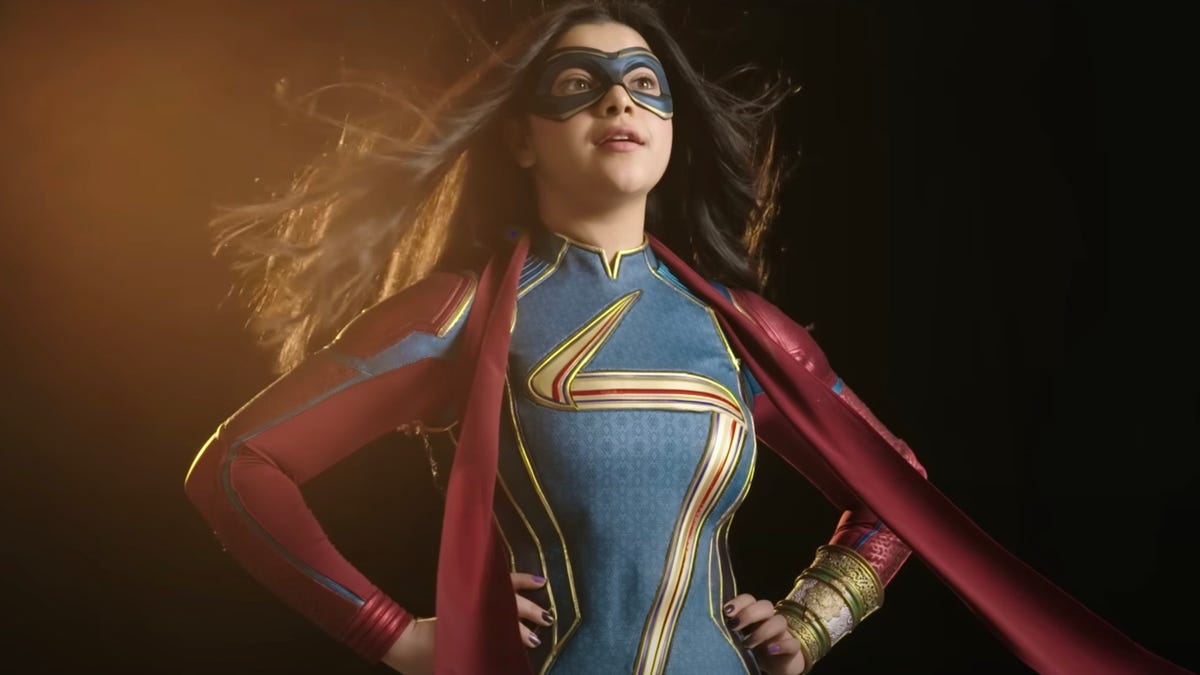'Ms. Marvel' on Disney Plus Is the Muslim Representation I've Been Waiting For
The new MCU series about a Pakistani Muslim-American superhero shows just how far Hollywood has come.

Seeing a Muslim superhero on TV is a dream come true.
Kamala Khan turns the key in the ignition, whispers "bismillah" and takes a deep breath. There's a look of fierce determination on her face as she slams her foot on the gas pedal. In a sudden movement, the car jerks back and slams into the parked car behind her, which happens to belong to her driving test examiner, who looks on in horror from the passenger seat.
"You set her up to fail, having her drive in the street with all the other cars," Khan's mom says accusingly to the examiner.
"Ma'am, because of your daughter, I'm walking home," he grudgingly responds.
This happens in the first four minutes of Disney Plus' new MCU show Ms. Marvel, which stars Iman Vellani as lead character Kamala Khan, an imaginative yet awkward – and often clumsy – Muslim-American teen growing up in Jersey City.
From the start, Islamic phrases like "bismillah" (in the name of God), "assalamu alaikum" (peace be onto you) and "astaghfirullah" (I seek forgiveness in God) are sprinkled into the show's dialogue, normalizing oft-repeated terms that are otherwise scarce in the world of television – one in which Muslims are hardly represented. It feels as if I'm in on a secret language.
Ms. Marvel, which debuts June 8, isn't just a show about a young girl who discovers her own superpowers. It's about a girl grappling with a dual identity as a Pakistani Muslim-American. It tells a story familiar to so many Muslims with hyphenated identities, Muslims who grew up without seeing someone like us on TV, and without hearing phrases that are a part of our everyday existence.
Ms. Marvel feels like the culmination of decades of pushback against misrepresentation in mainstream media. It feels like a celebration of what's possible when you get talented Muslim writers, actors and creators to build something true, authentic and enjoyable. That authenticity is reflected even in small details, like the mix of contemporary pop and Pakistani music that plays throughout the show, symbolizing the coming together of cultures.
Iman Vellani as Ms. Marvel/Kamala Khan.
For decades, Muslims have either been excluded from or vilified in Hollywood. We've regularly been portrayed as terrorists or "bad guys," especially after 9/11. In recent years, more shows have incorporated authentic representation, like Hulu's Ramy and NBC's Transplant. But Ms. Marvel takes that to the next level by introducing the world to a young, ambitious superhero whose most powerful attribute will undoubtedly be her ability to shatter stereotypes, and to show how teenage struggles can be relatable regardless of our background.
The show's first two episodes highlight challenges Khan faces when navigating her religious and cultural identity. There's the PE teacher who accidentally calls her "Camilia." The girl who's amused by the gold necklace Khan wears that spells her name in Arabic. The terrifying force of Pakistani women dubbed the "IlluminAunties" who will mercilessly critique every aspect of your life. It all contributes to a storyline that's sure to resonate with Muslim audiences, as well as anyone who's struggled to fit in or find their voice.
In addition, Khan navigates a precarious relationship with her mother, who doesn't understand her daughter's seemingly overblown imagination. When Khan asks to go to an event called AvengerCon in Captain Marvel cosplay, her mom says no and laments the "very tight suit" she'd be wearing.
"It's time to stop fantasizing," her mom tells her at one point. "I wish that you would just focus on you. Your grades, your family, your story. I mean, who do you want to be in this world? Do you want to be good, like we raised you to be? Or do you want to be this cosmic, head-in-the-clouds person?"
But her mom is also multifaceted. Beyond the strict immigrant parent trope, we learn fun tidbits about her – like the fact that she loves Bon Jovi and has a rich family history. The source of Kamala's powers is a bangle passed down from her maternal great-grandmother. Superpowers are part of her history and tradition, as opposed to a negative force that pulls her apart from her family.
Still, the constant familial conflict forces Khan to question what she's capable of. In one scene, she sits on a rooftop with her friend Bruno (Matt Lintz) and says defeatedly, "Let's be honest, it's not really the brown girls from Jersey City who save the world."
She'd be forgiven for feeling this way. For so long, that was the case. Heroes never looked like her – or like me. But that's finally changing. Now we're presented with Khan in all her genuine and unruly glory. And I couldn't be more thrilled to watch this story unfold.

